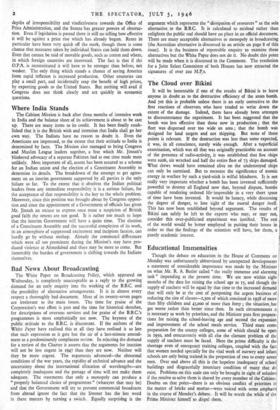Bad News About Broadcasting
The White Paper on Broadcasting Policy, which appeared on Wednesday, is completely unacceptable as a reply to the growing demand for an early enquiry into the working of the B.B.C. and . the possibility of alternative arrangements. It is in almost every respect a thoroughly bad document. Most of its twenty-seven pages are irrelevant to the main issues. The time for praise of the Corporation's war effort is past and the time for historical sketches, for descriptions of overseas services and for praise of the B.B.C.'s programmes is most emphatically not now. The keynote of the public attitude to the B.B.C. is discontent. If the authors of the White raper have realised this at all they have realised it so late that such expression as it gets has the air of a last-minute amend- ment to a predominantly complacent review. In rejecting the demand for a review of the Charter it asserts that the arguments for inaction will not be less cogent in 1947 than they are now. Neither will they be more cogent. The arguments advanced—the abnormal conditions of the war years, the rapidity of technical advance and the uncertainty about the international allocation of wavelengths—are completely inadequate and the passage of time will not make them adequate. The statements that only a monopoly can produce a " properly balanced choice of programmes " (whatever that may be) and that the Government will try to prevent commercial broadcasts from abroad ignore the fact that the listener has the last word in these matters by turning a switch. Equally surprising is the argument which represents the "dissipation of resources" as the sole alternative., to the B.B.C. It is calculated to mislead rather than enlighten the public and should have no place in an official document. There are many acceptable alternatives to monopoly in broadcasting (the Australian alternative is discussed in an article on page 8 of this
issue). It is the business reponsible enquiry to examine these alternatives but the White Paper does not do it. No doubt this point will be made when it is discussed in the Commons. The resolution for a Joint Select Committee of both Houses has now attracted the signatures of over 200 M.P.s.


























 Previous page
Previous page